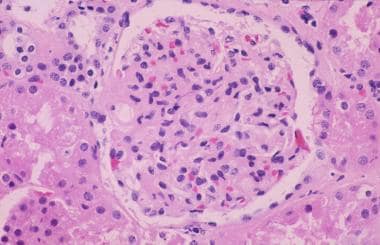APOL1 kidney risk variants and long-term kidney function in healthy middle-aged Black individuals

Black patients with kidney disease carrying 2 variants of the apolipoprotein L1 (APOL1) gene (referred to as ‘low-risk; and ‘high-risk’ genotypes), experience an accelerated decline in kidney function, if they develop CKD. It is unknown whether these genotypes negatively affects kidney function of healthy middle-aged individuals.
Why is this important?
The effect of apolipoprotein L1 (APOL1) genotypes on future risk of chronic kidney disease among middle-aged individuals with good kidney function is not well established.
For this reason, Doshi, 2024, in an important recent large long-term American study, investigated the relationship between APOL1 genotypes and long-term risk of CKD and ESRF – in healthy middle aged Black and White individuals (suitable kidney donors).
What did the study show?
In total, 5,886 healthy individuals (45-64 years old) enrolled in the Atherosclerosis Risk in Communities study with creatinine-based estimated glomerular filtration rate ≥80 mL/min, who would be suitable kidney donors.
There were 5,075 Whites (86%), 701 Blacks carrying the low-risk APOL1 genotype (12%), and 110 Blacks carrying the high-risk APOL1 genotype (2%). The mean age at baseline was 53 ± 6 years.
At 10 years, White participants had lower eGFR than low-risk and high-risk Black groups (89 vs 91 and 92 mL/min).
At 25 years, White participants continued to have lower eGFR than the low-risk group (70 vs 72 mL/min) but not compared with the high-risk APOL1 genotype (67 mL/min).
There was no difference in uACR (urinary protein) among groups at 10 and 25 years. The odds of developing CKD Stage 3a or worse, were not different between low-risk and high-risk APOL1 groups.
At last follow-up, <5% developed ESRF, and 45% of individuals either died or reached ESRF, with no difference in outcomes between the groups.
Conclusions. At 25 years of follow-up, the APOL1 high-risk genotype was not a major driver of future risk of chronic kidney disease (CKD).
As a by-product, this study produced important additional information on the effects of age and ethnicity on long-term renal function in White and Black individuals.
How does this affect you?
The study findings are relevant for counselling older living donor candidates as well as family members of patients with APOL1-associated kidney disease. In other words, in you are a healthy White and Black person, you should still be considered as a potential kidney donor, if you want to be one.
Note. Carrying out very large long-term studies like his one, is rarely done, hugely difficult and hugely important. Very well done to Doshi and colleagues.
Other resource
What is APOL1-mediated kidney disease?
Last Reviewed on 7 July 2024

